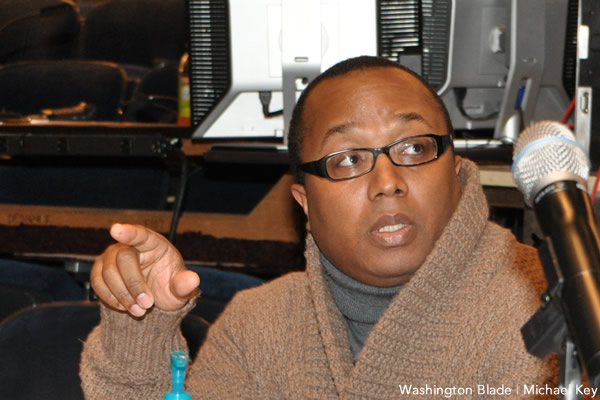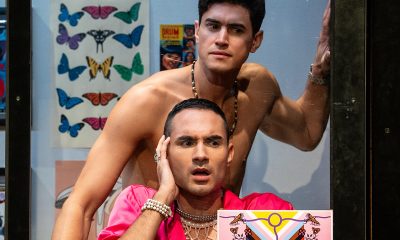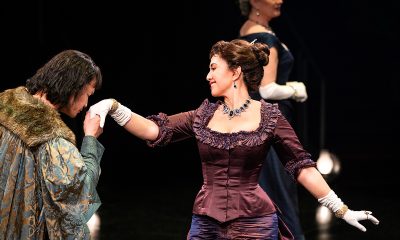Arts & Entertainment
The humanity of MLK
Gay-helmed ‘Mountaintop’ is ‘funny, spirited and serious’


New York-based Robert O’Hara says he finds it artistically rewarding to both write and direct. (Washington Blade photo by Michael Key)
‘The Mountaintop’
Through May 12
Arena Stage
1101 Sixth Street, SW
$40-$85
202-488-3300
arenastage.org
Early in playwright Katori Hall’s “The Mountaintop” (now at Arena Stage), Martin Luther King, Jr., smokes a cigarette and audibly uses the restroom.
“Quickly this iconic figure of history is defined as very human,” says the play’s director Robert O’Hara. “This can be hard on those who prefer that King retain his saint-like status, but really there’s nothing to be offended about. The work’s theatricality makes it clear we’re not doing bio drama but rather we’re asking ‘What if?’ The playwright is exploring King’s psyche.”
Set in Memphis’ Lorraine Motel in 1968 on the last night of King’s life, Hall’s play imagines an unexpected meeting between the already legendary 39-year-old civil rights activist and a feisty 20-year-old maid, Camae. Their 80-minute exchange (at turns funny, spirited and serious) is filled with biography and politics, prompting King to examine his past and unfinished dreams.
Arena’s production (featuring Bowman Wright as King and Joaquina Kalukango as the maid) is in collaboration with Houston’s Alley Theatre where it played before moving to D.C.
“But being in Washington makes it a different experience,” says O’Hara, who’s gay. “President Obama and the Martin Luther King Memorial are here. Dr. King made his ‘I Have a Dream Speech’ here. Washington audiences seem more political. Arena’s Kreeger Theater is much more intimate than the Houston venue. So much about the production is altered because it’s in this new Washington environment.”
O’Hara was introduced to the play in its early developmental stages. “The director originally slated to do the workshop reading pulled out at the last minute and I stepped in. In those days, a lot of people were cold on the project. But from the start, I liked how it revealed King’s humanity and enjoyed its explosive and erotic elements.”
Soon others would agree: In 2009, Hall’s play premiered in London where it was a sleeper hit, winning that season’s Olivier Award for best new play. It opened on Broadway in 2011 in a production starring big names Samuel L. Jackson and Angela Bassett.
As an undergraduate at Tufts University, O’Hara rather fleetingly considered a career in law. But by his third year, he knew he was destined to work in theater. O’Hara went on to at Columbia University where he studied directing. His mother wasn’t thrilled and suggested her son find something practical to fall back on. He did — playwriting. Not exactly what mom had in mind, but at 43, O’Hara has forged a busy and productive career involving both.
“With directing you have to wait for the phone to ring,” says O’Hara who lives in New York City with his longtime partner, a psychiatrist and avid theatergoer. “And others control whether you work or not; whereas with playwriting you can write whenever you want. Hopefully you have a few commissions to sustain you. I like to alternate the two. I’m happiest when I have a couple things going on at once.”
To live in New York, many playwrights have to work elsewhere. For O’Hara, that frequently means Washington. He’s premiered several plays here including his wild, time-traveling tragicomedy, “Insurrection: Holding History” at Theatre Alliance, and Woolly Mammoth’s productions of “Antebellum” (his exploration of race and history), and “Bootycandy,”a terrific autobiographical work about growing up black and gay in Cincinnati which he also directed. O’Hara is currently playwright in residence at Woolly Mammoth, a loosely defined gig that doesn’t require him to live in D.C.
“This town has been very good to me. Washington’s theater community is vibrant and it has been very receptive to my work. I’ve always enjoyed my time here. And now I’m happy to be working at Arena Stage.”
O’Hara’s career isn’t focused on being black and gay. “I don’t tend to think about that when I wake up in the morning. The same way I’m not conscious about being upright and breathing. Maybe other people look at me and see black and gay. I don’t feel that way,” he says. “I’ve never really felt part of a group on any subject. I don’t know many out writer/directors of color. I’m not interested in writing the well-made play. But what separates me is also what makes me unique. And while I think of myself as a shy person, I’m increasingly confident when it comes to my work.”
Photos
PHOTOS: Montgomery County Pride in the Plaza
LGBTQ celebration held in downtown Silver Spring

Montgomery County Pride in the Plaza was held on Sunday, June 29 at Veterans Plaza in Silver Spring, Md.
(Washington Blade photos by Michael Key)























The fifth annual Fredericksburg Pride march and festival was held on Saturday, June 28. A march through the streets of downtown Fredericksburg, Va. was followed by a festival at Riverfront Park.
(Washington Blade photos by Michael Key)



















India
Anaya Bangar challenges ban on trans women in female cricket teams
Former Indian cricketer Sanjay Bangar’s daughter has received support

Anaya Bangar, the daughter of former Indian cricketer Sanjay Bangar, has partnered with the Manchester Metropolitan University Institute of Sport in the U.K. to assess her physiological profile following her gender-affirming surgery and undergoing hormone replacement therapy.
From January to March 2025, the 23-year-old underwent an eight-week research project that measured her glucose levels, oxygen uptake, muscle mass, strength, and endurance after extensive training.
The results, shared via Instagram, revealed her metrics align with those of cisgender female athletes, positioning her as eligible for women’s cricket under current scientific standards. Bangar’s findings challenge the International Cricket Council’s 2023 ban on transgender athletes in women’s cricket, prompting her to call for a science-based dialogue with the Board of Control for Cricket in India and the ICC to reform policies for transgender inclusion.
“I am talking with scientific evidence in my hand,” Bangar said in an interview posted to her Instagram page. “So, I hope, this makes an impact and I will be hoping to BCCI and ICC talking with me and discussing this further.”
On Nov. 21, 2023, the ICC enacted a controversial policy barring trans women from international women’s cricket. Finalized after a board meeting in Ahmedabad, India, the regulation prohibits any trans player who has experienced male puberty from competing, irrespective of gender-affirming surgery or hormone therapy. Developed through a 9-month consultation led by the ICC’s Medical Advisory Committee, the rule aims to safeguard the “integrity, safety, and fairness” of women’s cricket but has drawn criticism for excluding athletes like Canada’s Danielle McGahey, the first trans woman to play internationally. The policy, which allows domestic boards to set their own rules, is slated for review by November 2025.
Bangar shared a document on social media verifying her participation in a physiological study at the Manchester Metropolitan University Institute of Sport, conducted from Jan. 20 to March 3, 2025, focused on cricket performance. The report confirmed that her vital metrics — including haemoglobin, blood glucose, peak power, and mean power — aligned with those of cisgender female athletes. Initially, her fasting blood glucose measured 6.1 mmol/L, slightly above the typical non-diabetic range of 4.0–5.9 mmol/L, but subsequent tests showed it normalized, reinforcing the study’s findings that her physical profile meets female athletic standards.
“I am submitting this to the BCCI and ICC, with full transparency and hope,” said Bangar. “My only intention is to start a conversation based on facts not fear. To build space, not divide it.”
In a letter to the BCCI and the ICC, Bangar emphasized her test results from the Manchester Metropolitan University study. She explained that the research aimed to assess how hormone therapy had influenced her strength, stamina, haemoglobin, glucose levels, and overall performance, benchmarked directly against cisgender female athletic standards.
Bangar’s letter to the BCCI and the ICC clarified the Manchester study was not intended as a political statement but as a catalyst for a science-driven dialogue on fairness and inclusion in cricket. She emphasized the importance of prioritizing empirical data over assumptions to shape equitable policies for trans athletes in the sport.
Bangar urged the BCCI, the world’s most influential cricket authority, to initiate a formal dialogue on trans women’s inclusion in women’s cricket, rooted in medical science, performance metrics, and ethical fairness. She called for the exploration of eligibility pathways based on sport-specific criteria, such as haemoglobin thresholds, testosterone suppression timelines, and standardized performance testing. Additionally, she advocated for collaboration with experts, athletes, and legal advisors to develop policies that balance inclusivity with competitive integrity.
“I am releasing my report and story publicly not for sympathy, but for truth. Because inclusion does not mean ignoring fairness, it means measuring it, transparently and responsibly,” said Bangar in a letter to the BCCI. “I would deeply appreciate the opportunity to meet with you or a representative of the BCCI or ICC to present my findings, discuss possible policy pathways, and work towards a future where every athlete is evaluated based on real data, not outdated perceptions.”
Before her transition, Bangar competed for Islam Gymkhana in Mumbai and Hinckley Cricket Club in the U.K., showcasing her talent in domestic cricket circuits. Her father, Sanjay Bangar, was a dependable all-rounder for the Indian national cricket team from 2001 to 2004, playing 12 test matches and 15 One Day Internationals. He later served as a batting coach for the Indian team from 2014 to 2019, contributing to its strategic development.
Cricket in India is a cultural phenomenon, commanding a fanbase of more than 1 billion, with more than 80 percent of global cricket viewership originating from the country.
The International Cricket Council, the sport’s governing body, oversees 12 full member nations and more than 90 associate members, with the U.S. recently gaining associate member status in 2019 and co-hosting the 2024 ICC Men’s T20 World Cup. The BCCI generated approximately $2.25 billion in revenue in the 2023–24 financial year, primarily from the Indian Premier League, bilateral series, and ICC revenue sharing. The ICC earns over $3 billion from media rights in India alone for the 2024–27 cycle, contributing nearly 90 percent of its global media rights revenue, with the BCCI receiving 38.5 percent of the ICC’s annual earnings, approximately $231 million per year.
Women’s cricket in India enjoys a growing fanbase, with over 300 million viewers for the Women’s Premier League in 2024, making it a significant driver of the sport’s global popularity. The International Cricket Council oversees women’s cricket in 12 full member nations and over 90 associate members, with the U.S. fielding a women’s team since gaining associate status in 2019 and competing in ICC events like the 2024 Women’s T20 World Cup qualifiers. The BCCI invests heavily in women’s cricket, allocating approximately $60 million annually to the WPL and domestic programs in 2024–25, while contributing to the ICC’s $20 million budget for women’s cricket development globally. India’s media market for women’s cricket, including WPL broadcasting rights, generated $120 million in 2024, accounting for over 50 percent of the ICC’s women’s cricket media revenue.
“As a woman, I feel when someone says that they are women, then they are, be trans or cis. A trans woman is definitely the same as a cis woman emotionally and in vitals, and specially, when someone is on hormone replacement therapy. Stopping Anaya Bangar from playing is discrimination and violation of her rights. It is really sad and painful that every transwoman need to fight and prove their identity everywhere,” said Indrani Chakraborty, an LGBTQ rights activist and a mother of a trans woman. “If ICC and BCCI is stopping her from playing for being transgender, then I will say this to be their lack of awareness and of course the social mindsets which deny acceptance.”
Chakraborty told the Blade that Bangar is an asset, no matter what. She said that the women’s cricket team will only benefit by participation, but the discriminating policies are the hindrance.
“Actually the transgender community face such discrimination in every sphere. In spite of being potent, they face rejection. This is highly inhuman. These attitudes is regressive and will never let to prosper. Are we really in 2025?,” said Chakraborty. “We, our mindset and the society are the issues. We, as a whole, need to get aware and have to come together for getting justice for Anaya. If today, we remain silent, the entire community will be oppressed. Proper knowledge of gender issues need to be understood.”
The BCCI and the International Cricket Council have not responded to the Blade’s repeated requests for comment.
-

 U.S. Supreme Court5 days ago
U.S. Supreme Court5 days agoSupreme Court upholds ACA rule that makes PrEP, other preventative care free
-

 District of Columbia5 days ago
District of Columbia5 days agoActivists protest outside Hungarian Embassy in DC
-

 Virginia4 days ago
Virginia4 days agoSpanberger touts equality, reproductive rights in Arlington
-

 Books4 days ago
Books4 days agoTwo new books on dining out LGBTQ-style












